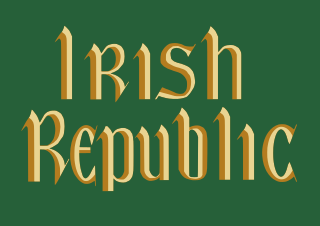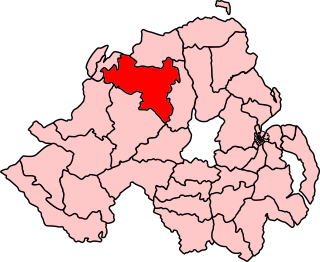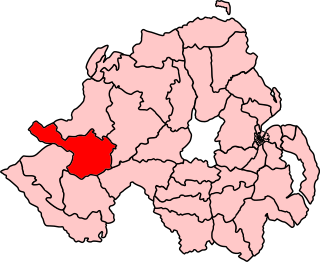
Sinn Féin is an Irish republican and democratic socialist political party active throughout both the Republic of Ireland and Northern Ireland.

The Ulster Unionist Party (UUP) is a unionist political party in Northern Ireland. The party was founded in 1905, emerging from the Irish Unionist Alliance in Ulster. Under Edward Carson, it led unionist opposition to the Irish Home Rule movement. Following the partition of Ireland, it was the governing party of Northern Ireland between 1921 and 1972. It was supported by most unionist voters throughout the conflict known as the Troubles, during which time it was often referred to as the Official Unionist Party (OUP).

The Parliament of Northern Ireland was the home rule legislature of Northern Ireland, created under the Government of Ireland Act 1920, which sat from 7 June 1921 to 30 March 1972, when it was suspended because of its inability to restore order during The Troubles, resulting in the introduction of Direct Rule. It was abolished under the Northern Ireland Constitution Act 1973.
The Alliance Party of Northern Ireland (APNI), or simply Alliance, is a liberal and centrist political party in Northern Ireland. As of the 2022 Northern Ireland Assembly election, it is the third-largest party in the Northern Ireland Assembly, holding seventeen seats, and has made recent breakthroughs to place third in first preference votes in the 2019 European Parliament election and third highest-polling regionally at the 2019 UK general election. The party won one of the three Northern Ireland seats in the European Parliament, and one seat, North Down, in the House of Commons, the lower house of the Parliament of the United Kingdom.

The UK Unionist Party (UKUP) was a small unionist political party in Northern Ireland from 1995 to 2008 that opposed the Good Friday Agreement. It was nominally formed by Robert McCartney, formerly of the Ulster Unionist Party, to contest the 1995 North Down by-election and then further constituted to contest the 1996 elections for the Northern Ireland Forum. McCartney had previously contested the 1987 general election as an independent using the label Real Unionist.

The 2003 Northern Ireland Assembly election was held on Wednesday, 26 November 2003, after being suspended for just over a year. It was the second election to take place since the devolved assembly was established in 1998. Each of Northern Ireland's eighteen Westminster Parliamentary constituencies elected six members by single transferable vote, giving a total of 108 Members of the Legislative Assembly (MLAs). The election was contested by 18 parties and many independent candidates.

The 1918 United Kingdom general election was called immediately after the Armistice with Germany which ended the First World War, and was held on Saturday, 14 December 1918. The governing coalition, under Prime Minister David Lloyd George, sent letters of endorsement to candidates who supported the coalition government. These were nicknamed "Coalition Coupons", and led to the election being known as the "coupon election". The result was a massive landslide in favour of the coalition, comprising primarily the Conservatives and Coalition Liberals, with massive losses for Liberals who were not endorsed. Nearly all the Liberal MPs without coupons were defeated, including party leader H. H. Asquith.
Elections in Northern Ireland are held on a regular basis to local councils, the Northern Ireland Assembly and to the Parliament of the United Kingdom.
Abstentionism is standing for election to a deliberative assembly while refusing to take up any seats won or otherwise participate in the assembly's business. Abstentionism differs from an election boycott in that abstentionists participate in the election itself. Abstentionism has been used by Irish republican political movements in the United Kingdom and Ireland since the early 19th century. It was also used by Hungarian and Czech nationalists in the Austrian Imperial Council in the 1860s.
The Independent Labour Group was a nationalist political party in Northern Ireland from the late 1950s to the mid-1960s. Sometimes known as the Independent Labour Party, it was formed in 1958 in Belfast by independent Labour MP Frank Hanna, with the support of various local Roman Catholic clerics. That year, the party wiped out the Irish Labour Party on Belfast City Council.

South Fermanagh was a constituency of the Parliament of Northern Ireland.

Mid Londonderry was a county constituency comprising the central part of County Londonderry. It was created in 1929, when the House of Commons Act 1929 introduced first-past-the-post elections throughout Northern Ireland. It was one of five single-member constituencies replacing the former five-member Londonderry constituency. The constituency survived unchanged, returning one member of Parliament until the Parliament of Northern Ireland was temporarily suspended in 1972, and then formally abolished in 1973.

North Londonderry was a county constituency comprising the northern part of County Londonderry. It was created in 1929, when the House of Commons Act 1929 introduced first-past-the-post elections throughout Northern Ireland. It was created in 1929 as one of five single-member constituencies replacing the former five-member Londonderry constituency. The constituency survived unchanged, returning one member of Parliament until the Parliament of Northern Ireland was temporarily suspended in 1972, and then formally abolished in 1973.

South Tyrone was a constituency of the Parliament of Northern Ireland.

North Tyrone was a constituency of the Parliament of Northern Ireland.

West Tyrone was a constituency of the Parliament of Northern Ireland.

Mid Armagh was a constituency of the Parliament of Northern Ireland.
East Down was a constituency of the Parliament of Northern Ireland.
Mid Down was a constituency of the Parliament of Northern Ireland.
Iveagh was a constituency of the Parliament of Northern Ireland.

















